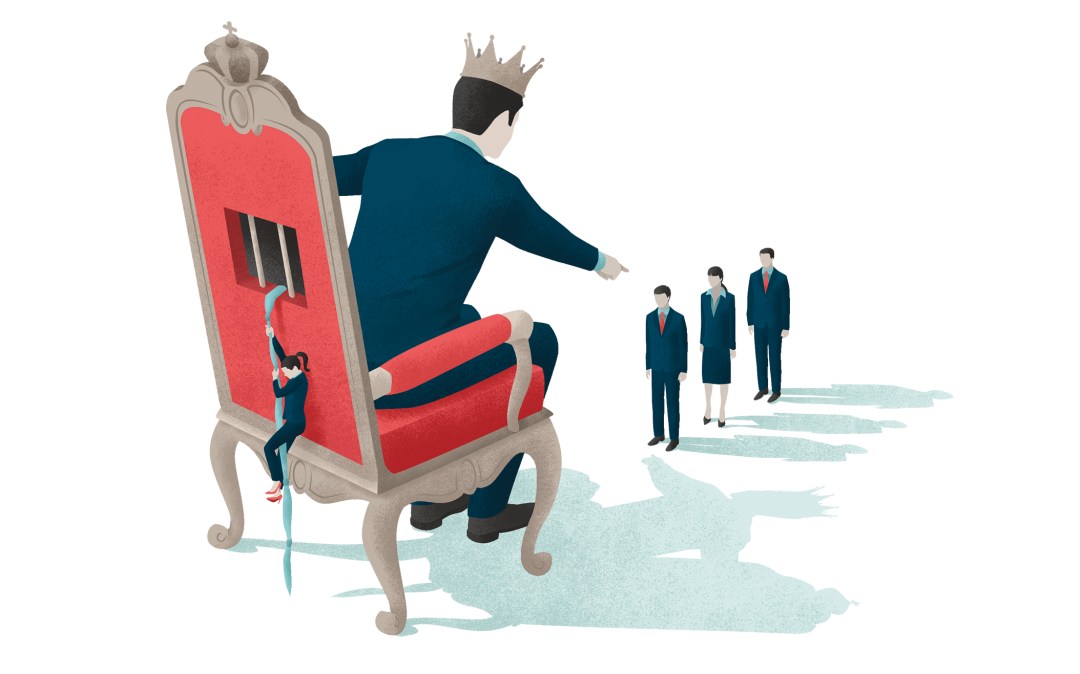Help! My boss is a narcissist
Our award-winning coach, Kim Morgan, gives advice on how to deal with a bullying, dominating boss, who takes pleasure in humiliating staff

Coaching session one: doing the emotional groundwork
Denise* has spent more than 35 years working as a senior PA to a series of successful CEOs. She told me that, while she knew high achievers could be demanding, she had never in her working life experienced anyone like her current boss.
Denise’s discomfort was visible – she was fidgeting and kept looking over her shoulder, as if she felt she was being watched or overheard. Her boss had been extremely charming when she first started working for him. Denise said, ‘He can really fool you into thinking he is lovely. He can be so charismatic if he likes you but you are either “in” or “out”. If you are “in”, he beams all his charm on you and you feel really honoured. If you are “out”, he is cruel, puts you down and makes fun of you.
He is a bully and I can see that everyone around him knows it, but we are all scared. The “in” crowd fawn around him and fear putting a foot wrong. The rest of us don’t dare stand up to him because that is the biggest mistake anyone can make. He flies into a rage if he is ever challenged. He’s the boss and he has total control. He is not accountable to anyone and he tramples over everyone to get what he wants.’
In this first session, I just listened to Denise. I did also say how hard it must be for her to have to work so closely with a person like that, as I felt that she needed some empathy and acknowledgement of her feelings before we embarked on more challenging coaching work. At the end of the session, she seemed exhausted and relieved to have spoken some of these things out loud for the first time.
Coaching session two: identifying the disorder
I am never keen on labelling people but, based on everything Denise had said to me, her boss seemed to be displaying all the signs of narcissism. Denise arrived for the second session in a terrible state, saying her elderly mother had been diagnosed with a terminal illness. When she’d told her boss the news, he’d replied, ‘Oh, that is great! This is going to ruin my life for the next few months, isn’t it?’ All the narcissitic indications were there:
- Responding to challenge or criticism with rage
- Lacking empathy for others
- Obsessive need for attention and praise from others
- Excessive self-interest and self-importance
- Dominating, humiliating and controlling others
- Using insincere charm to get their own needs met
- Being prone to sudden and irrational changes of mood
Denise had spent her whole life assuming that others behaved in accordance with her moral values. She had spent all her time with her boss, wondering what she could do to make things better. It took a long time for her to accept that someone who has narcissist personality disorder has little or no empathy. Denise came to accept that she needed to look after herself in this toxic relationship. One strategy is to learn to identify the narcissist’s predictable patterns of behaviour, and to stop expecting anything different from them.
Coaching session three: taking back control
In our final session, Denise talked about how much time she had wasted thinking about what she could do differently in order to please her boss. She decided to focus on herself and her family and friends, instead. ‘Because I have been so upset about what’s going on at work, I have not been there for all the other people in my life who really need me.’
In the end, Denise took control of her situation by deciding to walk away from her boss. She felt a huge sense of freedom and empowerment. The last time we met, she was juggling job offers, and trying to decide which new opportunity would be the best for her.
*Name has been changed
For more from Kim, go to barefootcoaching.co.uk @BarefootCoaches
Illustration: Andrea De Santis








